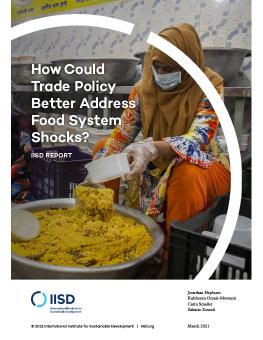
How Could Trade Policy Better Address Food System Shocks?
This report examines how trade policy can help governments anticipate and respond to food system shocks while avoiding harm to producers and consumers in other countries. It also makes the case that major importing and exporting nations have a particular responsibility to help safeguard the stability of global food markets.
Shocks to the food system, such as the COVID-19 pandemic, can disrupt supply chains, exacerbate unemployment, and reverse progress fighting hunger and poverty. Climate scientists have also warned that shocks associated with more frequent and intense extreme weather events are among factors set to destabilize markets and undermine food security in years ahead. This paper looks at how trade policy can better address food system shocks, and makes 13 recommendations, structured around four key public policy objectives:
- Ensuring food access and availability for poor consumers
- Safeguarding farmers’ livelihoods in the event of sudden price depressions
- Improving how food markets function by allocating resources more equitably and sustainably
- Rebuilding trust and confidence in global norms and institutions
You might also be interested in
WTO Agriculture Talks: Prospects for progress on SDG 2
This policy brief describes the state of play in agriculture negotiations at the World Trade Organization, including the positions of key members and negotiating coalitions, and looks at possible options for supporting progress on Sustainable Development Goal 2.
How Can World Trade Organization Rules and Flexibilities Promote Food Security in Least Developed Countries?
Least developed countries (LDCs) need more investment in agriculture to increase their agricultural productivity and promote their food security. Existing World Trade Organization (WTO) rules and flexibilities on agricultural domestic support can help. New WTO rules and flexibilities can also help LDCs attract more private investment to increase their agricultural productivity and promote their food security.
Adding Fuel to the Fire: How export restrictions can exacerbate climate change’s impacts on global food security
Higher temperatures will likely reduce agricultural yields and production in most countries, raising global food prices and worsening food security. Avoiding export restrictions is crucial.
WTO Agriculture Negotiations at MC13: What does the lack of outcomes mean for least developed countries and other vulnerable economies?
IISD expert Facundo Calvo analyzes what came out of the WTO's agriculture negotiations at the 13th Ministerial Conference in Abu Dhabi and its implications for least developed countries and other vulnerable economies.